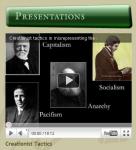
One-stop shopping for evolution resources
In the last two years, the NCSE has reached out to members, the public, and the press, via YouTube, Facebook, Twitter, and other digital tools. Keeping track of all these venues can be daunting. Fret no more!
Today we're unveiling a new Multimedia page that pulls together our videos (speeches, interviews, tutorials, and more), audio/podcasts (from radio interviews to classic hits such as the Miller-Morris debate), presentations (from creationist tactics to how to teach evolution), and charts/graphics (from relevant reports, surveys, academic papers, studies).
In short, it's one-stop info shopping for anyone who wants to follow the battle for evolution education in America.
The page: ncse.com/multimedia
Some notable postings this week include a clutch of presentations: "Creationist tactics in misrepresenting the science of evolution", "The evolution of creationism" (both featuring executive director Dr. Eugenie Scott), and "Why we need to teach evolution" (by NCSE's Josh Rosenau). We've also posted various podcasts (including BBC's recent debate in Egypt on evolution and faith, which featured Dr. Scott), and a new video posing the question: Do we need an NCSE for climate change?
The page also offers one-click access to everything on our YouTube channel, Facebook page, Twitter feed, and RSS feed.
CONTACT: Robert Luhn, Director of Communications, NCSE, 510-601-7203, luhn@ncse.com
Web site: www.ncse.com
The National Center for Science Education (NCSE) is a not-for-profit, membership organization that defends and promotes the teaching of evolution in the public schools. The NCSE provides information and resources to schools, parents, and concerned citizens working to keep evolution in public school science education. We educate the press and public about the scientific, educational, and legal aspects of the creation and evolution controversy, and supply needed information and advice to defend good science education at local, state, and national levels. Our 4000 members are scientists, teachers, clergy, and citizens with diverse religious affiliations.
